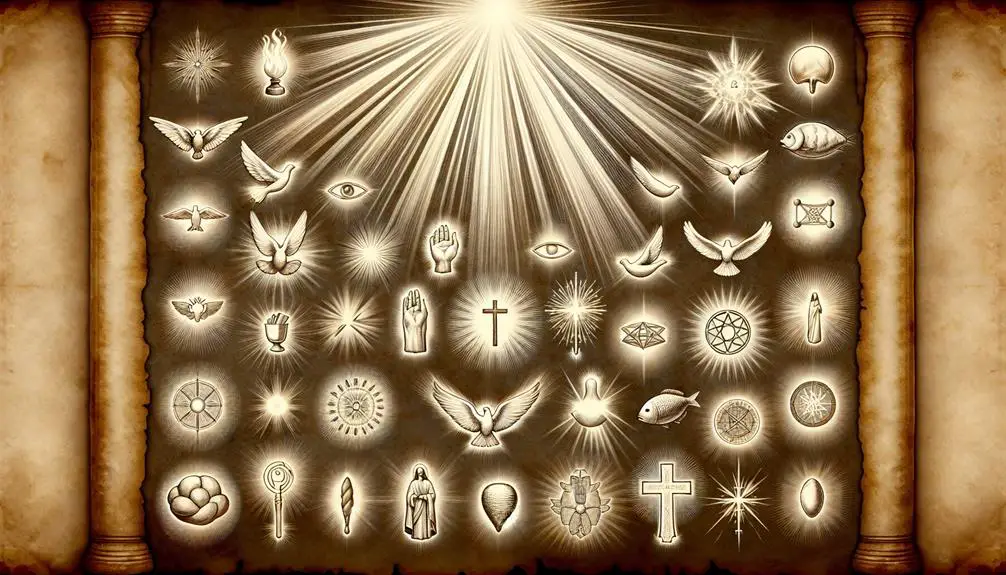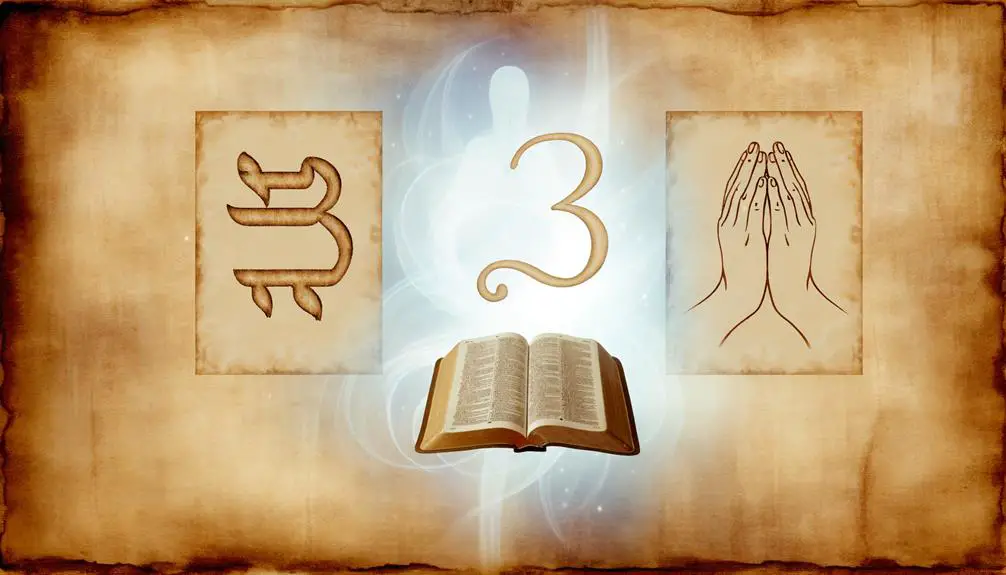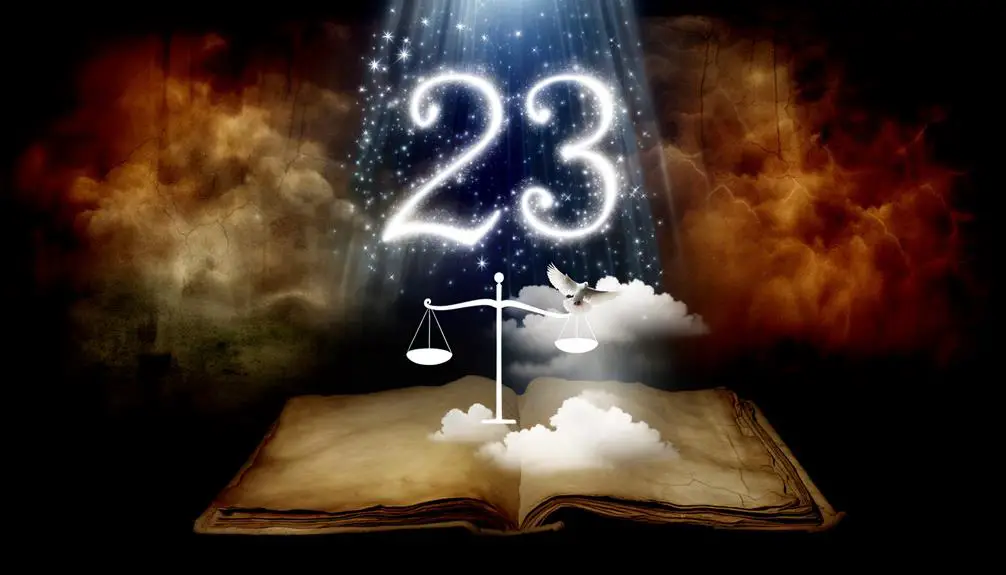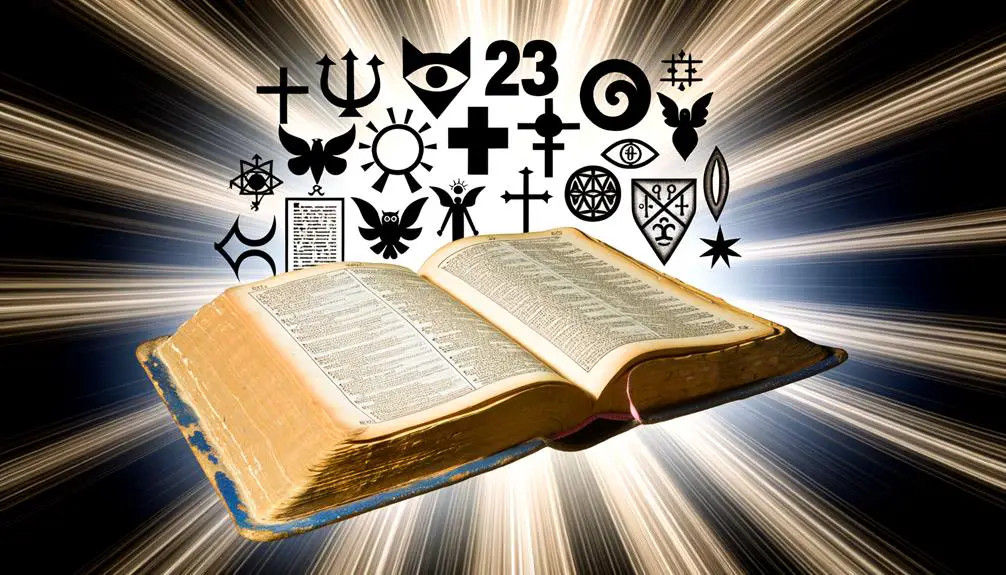Learn about the enigmatic role of the number 23 in the Bible, from themes of rebellion to divine protection, and uncover its deeper meanings.

The Number 23 in the Bible
In the tapestry of biblical numerology, the number 23 emerges as a thread woven with themes of rebellion and divine judgment, yet it's not without its protective knots. You'll find its presence thought-provoking, especially when considering its symbolism in historical and prophetic contexts.
It's a number that invites you to explore the depths of its significance, from instances of divine intervention to its role in reflecting strength and protection. As you ponder its influence on theological perspectives and modern interpretations, you'll realize that the story of 23 is far from complete, beckoning you to uncover more of its hidden layers.
Key Takeaways
- The number 23 symbolizes death or an end, enriching biblical narratives with theological significance.
- Its appearances in scripture are tied to divine judgment, completion, and significant shifts in narrative.
- Cultural and historical contexts give depth to the symbolism of 23, influencing interpretations and theological discussions.
- 23 also marks divine intervention and protection, reflecting its importance in biblical prophecies and leadership contexts.
Significance in Biblical Numerology

In biblical numerology, the number 23 holds a unique significance, often seen as symbolizing death or an end, a concept deeply rooted in various scriptural passages. This interpretation isn't arbitrary; it's woven into the fabric of the scriptures through mathematical patterns and cultural influences that echo the beliefs and traditions of the times.
You'll find that the Bible is rich with numbers that carry deeper meanings beyond their literal sense. The number 23 is no exception. Its recurring presence isn't just a coincidence but a deliberate inclusion by the authors to convey specific theological messages. These mathematical patterns serve as a bridge between the tangible and the spiritual, offering you a glimpse into the divine design that the biblical authors believed governed the universe.
Moreover, the significance of the number 23 extends beyond the scriptures, influenced by and influencing the cultures in which the Bible was written and has been read. Cultural influences play a crucial role in shaping the interpretation of numbers in the Bible. For instance, in some cultures, numbers are believed to possess inherent qualities that can affect human lives and events. This belief system is reflected in the biblical text, where numbers such as 23 are imbued with symbolic meanings that resonate with the readers' and listeners' cultural understandings and experiences.
Analyzing the number 23 in this context reveals a fascinating interplay between mathematical patterns and cultural influences, a testament to the complexity and depth of biblical numerology. Understanding this intricate relationship offers you a richer appreciation of the biblical narrative and its enduring significance.
Historical Context and Appearances

You'll find that the number 23 holds a distinct place in the tapestry of biblical history, emerging in ancient texts with profound significance.
Its notable instances across Scripture offer a rich field for analysis, from its appearances to the symbolism and interpretations that have been debated by scholars.
Understanding this number's context and its manifestations provides a deeper insight into its unique role within biblical narratives and theological discussions.
Significance in Ancient Texts
Throughout ancient texts, the number 23 emerges with profound significance, marking its presence in various historical and religious contexts. This number's allure isn't just in its frequent appearances but in the underlying mathematical patterns and cultural impacts it harbors. Analyzing these aspects reveals:
- Mathematical Patterns: Scholars have noted its presence in various ancient numerical systems, suggesting a deeper understanding of its significance.
- Cultural Impacts: The number influenced ceremonies and beliefs, embedding itself in the fabric of ancient societies.
- Symbolic Representations: In many cultures, 23 held symbolic meanings related to life, death, and rebirth cycles.
- Architectural Alignments: Some ancient structures are aligned in ways that correspond to numerical representations of 23, hinting at its importance in design and construction.
This analysis underscores how 23's significance transcends mere coincidence, reflecting its deep-seated role in human history and spirituality.
Notable Biblical Instances
Exploring the Bible reveals that the number 23 holds significant historical and symbolic weight, appearing in various passages and contexts. Genealogy mentions are particularly noteworthy, where the number often emerges in delineating familial lines, suggesting a layer of historical depth and divine order. For instance, the genealogical records meticulously detail generations, with the number 23 occasionally marking specific lineages or ages, hinting at its underlying significance within the tapestry of biblical history.
Architectural dimensions within the scripture further underscore its importance, where measurements often align with the number 23, imbuing structures with a sense of sacred geometry. These instances aren't merely coincidental but are woven into the narrative to underscore a divine blueprint, reflecting a harmony between the physical and spiritual realms. This analytical examination highlights the number's nuanced role across different biblical contexts, offering a glimpse into its multifaceted significance.
Symbolism and Interpretations
Moving beyond the physical manifestations and genealogical instances, it's crucial to examine the rich symbolism and varied interpretations of the number 23 within the biblical narrative. The depth of its significance extends beyond simple occurrences, touching on:
- Mathematical Patterns: Scholars have identified intricate mathematical structures within the scriptures, where 23 often marks pivotal shifts or hidden layers of meaning.
- Prophetic Symbolism: It's seen as representing divine completion or judgment, reflecting its weight in prophetic messages.
- Cultural Impact: Beyond the text, 23 has influenced theological discussions and cultural beliefs, shaping how communities interpret divine interaction.
- Historical Context: Its appearances are closely linked with historical events within the Bible, suggesting a deliberate use by authors to convey specific theological points.
Symbolism of Rebellion

In biblical scholarship, the number 23 often emerges as a symbol of rebellion, reflecting its nuanced appearances across various texts. This symbolism isn't just confined to ancient scriptures but extends its influence into modern rebellion, shaping cultural impacts in profound ways. You'll find that the number's recurrence isn't coincidental but rather imbued with deep theological significance, reflecting humanity's continuous struggle against divine commandments and societal norms.
Delving into the specifics, the instances of 23 in biblical narratives frequently align with acts of defiance or pivotal moments leading to change. For example, consider the rebellious actions of certain figures at key junctures in biblical stories, which are subtly underscored by the presence or reference to the number 23. This isn't merely a matter of numerological curiosity but a deliberate choice to underscore themes of disobedience and the quest for autonomy.
The cultural impacts of this symbolism are vast. In contemporary discourse, the number 23 has transcended its biblical origins to symbolize rebellion in broader societal contexts. It's no longer just a biblical reference but a cultural shorthand for challenging the status quo, reflecting its enduring relevance.
As you explore this theme, it's important to appreciate the depth and complexity of the number 23's symbolism. It's not merely about rebellion for its own sake but rather a nuanced commentary on the human condition, the tension between obedience and autonomy, and the perpetual cycle of defiance and conformity. This symbolism, rooted in ancient texts, continues to resonate, offering insights into both historical and modern contexts of rebellion.
Themes of Strength and Protection

Beyond its association with rebellion, the number 23 also embodies themes of strength and protection within biblical contexts, offering a multifaceted interpretation of its significance. When you delve deeper into the scriptures, you'll find that this number doesn't just stand alone; it's intricately connected with the notions of divine safeguarding and fortitude, especially seen through:
- Military campaigns: The biblical narrative often intertwines the number 23 with accounts of military endeavors. These stories aren't just historical recounts; they symbolize the broader theme of divine strength and protection. The involvement of 23 in these contexts suggests that the outcomes of such campaigns were underpinned by a higher power, providing both physical and spiritual fortitude to the participants.
- Covenant promises: The number is also significant in the context of covenantal relationships. These covenants, often marked by the number 23, aren't mere agreements but divine assurances of protection and blessing. They underscore a profound spiritual truth that divine strength and safeguarding are inherent in the covenantal relationship between the divine and humanity.
- Prophetic declarations: Throughout biblical lore, prophetic messages tied to the number 23 often carry undertones of strength and divine safeguarding. These prophecies serve as reminders that, amidst turmoil and uncertainty, there exists a protective divine decree.
- Leadership and governance: The number 23 appears in contexts relating to leadership, suggesting that divine strength and protection are pivotal for just and effective governance. This connection highlights the belief that leadership, when divinely ordained, is endowed with strength and protection beyond human capabilities.
Divine Intervention and Judgment

The concept of divine intervention and judgment, as depicted within biblical narratives, reveals a complex interplay of mercy, justice, and ultimate accountability. You'll find that modern numerology and celestial patterns often intersect with these themes, offering a unique lens through which to understand divine actions. For instance, the number 23, though not explicitly linked to judgment in the text, resonates with patterns of divine intervention when analyzed through the prism of numerology.
In this context, the analysis becomes particularly insightful. Numerology, a field that assigns symbolic meaning to numbers, suggests that 23 embodies a dual nature of both chaos and order. This duality mirrors the biblical portrayal of divine judgment as both a disruptive force and a means of establishing divine order. The celestial patterns, observed through the movements and alignments of heavenly bodies, have historically been interpreted as signs of divine will. When these celestial signs align with significant numerical patterns, such as the occurrence of 23, it's seen as indicative of moments of divine intervention or impending judgment.
This scholarly approach requires a detailed examination of the biblical text, alongside an understanding of numerology and astronomy. It's a reminder that divine intervention and judgment aren't merely acts of retribution but are deeply tied to the restoration of balance and the enforcement of divine law. Through this lens, the number 23 serves as a symbol of the complex, often mysterious, ways in which divine justice unfolds, reflecting an intricate balance of mercy, justice, and accountability that transcends human understanding.
Connections to Prophecy

As you explore the connections to prophecy within the biblical context, it's crucial to examine how the number 23 has been linked to the fulfillment of prophecies.
Through analyzing specific prophecy fulfillment examples, you'll gain a deeper understanding of its significance.
Additionally, insights into numerological symbolism will illuminate the intricate ways this number has woven itself into the predictive texts of the Bible.
Prophecy Fulfillment Examples
Considering the profound significance of the number 23 in biblical texts, it's imperative to explore how its appearances often presage fulfillment of prophecy, reflecting a deeper, divinely orchestrated pattern. This connection not only influences theological interpretations but also shapes modern predictions and cultural impacts, offering a compelling lens through which to view historical events.
- Direct Correlation: Instances where 23 directly aligns with prophecy fulfillment dates or events.
- Symbolic Representation: The symbolic use of 23 in texts foreshadowing significant occurrences.
- Pattern Recognition: Identifying patterns where 23 recurrently precedes pivotal biblical moments.
- Influence on Modern Predictions: How the perceived prophetic nature of 23 affects contemporary forecasting and cultural narratives.
This numerical aspect invites a deeper exploration into the structured design of biblical prophecy and its lasting implications.
Numerological Symbolism Insights
Delving into the realm of numerological symbolism, it's essential to understand how the number 23 serves not merely as a figure but as a profound connector to prophecy within biblical texts. Modern numerology and its cultural impact further illuminate this connection, suggesting that 23's presence in prophecy is neither coincidental nor trivial but deeply significant.
Aspect |
Insight |
|---|---|
Biblical Prophecy |
23 linked to pivotal prophetic events |
Modern Numerology |
Elevates 23's significance |
Cultural Impact |
Influences interpretations of texts |
Academic Analysis |
Supports 23's prophetic relevance |
Biblical Narratives |
Showcases 23 in key scriptural moments |
Through this lens, one gains a nuanced understanding of 23's role, underscoring its importance in both historical and contemporary contexts.
Influence on Theological Perspectives

The appearance of the number 23 in biblical contexts has significantly shaped theological interpretations and debates among scholars. This number's influence extends beyond mere numerology, touching upon deeper cultural impacts and psychological effects that resonate with both ancient and contemporary audiences. Delving into this influence unveils a complex interplay between scripture and human cognition.
- Cultural Impacts: The number 23 has woven itself into the fabric of various cultures, primarily through its biblical associations. This integration has led to a nuanced understanding of its significance, influencing rituals, traditions, and even architectural designs. Scholars argue that this cultural embedding shapes theological perspectives by aligning scriptural interpretations with the lived experiences of the faithful.
- Psychological Effects: The recurrence of the number 23 in key biblical passages has sparked intrigue and fascination. This fascination plays a role in how individuals and communities perceive and interpret biblical teachings, potentially emphasizing certain narratives over others based on this numerical occurrence.
- Theological Debates: The prominence of the number 23 has fueled discussions and debates among theologians regarding its intended symbolism. Does it represent divine completeness, chaos, or something entirely different? These debates underscore the dynamic nature of scriptural interpretation.
- Interpretative Frameworks: Scholars have developed various frameworks to understand the implications of the number 23 within biblical texts. These frameworks consider historical, cultural, and textual analyses to offer comprehensive insights into its theological significance.
Reflections in Modern Interpretations

In modern interpretations, scholars scrutinize how the number 23's biblical significance resonates with contemporary theological discussions, shedding light on its enduring impact across epochs. You'll find that this number, woven into the fabric of scripture, carries forward into modern culture, inviting a myriad of interpretations and reflections. It isn't just a number; it's a symbol that intersects faith, mystery, and the human condition.
Modern culture, with its complex web of beliefs and skepticism, has latched onto the number 23, exploring its implications beyond traditional religious contexts. Scholars point out that this fascination isn't merely about numerology; it's about the psychological impact of what the number represents – the unknown, the divine intervention, and the quest for understanding in a seemingly chaotic world. You're seeing a number that, historically anchored in sacred texts, now permeates discussions in psychology, literature, and even popular media.
The psychological impact of the number 23 is profound. Studies suggest that humans are pattern-seeking creatures, and the recurrence of 23 in significant biblical events offers a sense of order and divine presence. This reassurance, or sometimes the challenge it presents, plays into the wider theological discussions in modern times. You're observing a bridge between ancient beliefs and current existential inquiries, where the number 23 serves as a focal point for debate and introspection.
In essence, the journey of the number 23 from biblical times to the present day illustrates how symbols evolve while retaining their core significance. It underscores the human quest for meaning, connecting the dots between past and present, sacred and secular. As you delve deeper, you're not just exploring a number; you're unraveling the tapestry of human belief and the enduring quest for understanding in the face of the unknown.
Frequently Asked Questions
How Has the Interpretation of the Number 23 in the Bible Evolved in Different Christian Denominations Over Time?
You'll find that interpretive traditions have deeply influenced how different Christian denominations understand the significance of numbers, leading to varied numerology debates.
Over time, these debates have shaped the interpretation of specific numbers, reflecting shifts in theological emphasis and scriptural analysis.
As scholars and believers delve into ancient texts, they uncover layers of meaning that reflect evolving doctrinal stances, further diversifying the spiritual landscape across denominations.
This dynamic process showcases the rich tapestry of Christian thought.
Are There Any Notable Instances Where the Number 23 Appears in Other Religious Texts Outside of the Bible, Suggesting a Universal Significance?
You'll find that numerology studies often reveal fascinating cultural parallels in religious texts beyond the Bible, suggesting a broader significance to the number 23.
While exploring various scriptures, you'll notice intriguing instances where 23 appears, hinting at universal themes of life, death, and renewal.
This pattern underscores the importance of numbers in conveying spiritual truths across different faiths, highlighting a shared human fascination with the symbolic power of numerology.
Has the Number 23 Been Linked to Any Significant Biblical Artifacts or Locations Discovered Through Archaeology?
You're diving into an ocean of mysteries where every artifact whispers ancient secrets. Among these whispers, numerology theories suggest that the number 23 plays a pivotal role.
Specifically, when it comes to artifact authentication, scholars rigorously analyze connections to significant biblical locations or artifacts unearthed through archaeology. This meticulous scrutiny unveils the profound impact of numerical symbols, demonstrating how they intricately weave through the fabric of our historical and spiritual understanding.
How Do Skeptics and Secular Scholars View the Importance of the Number 23 in Biblical Context Compared to Believers?
You'll find that skeptics and secular scholars generally view the significance of numerology in religious texts with skepticism, contrasting with believers who may see it as imbued with divine meaning.
Their approach often emphasizes cultural interpretations over mystical or prophetic ones, analyzing numbers like 23 within historical or literary contexts rather than as inherently sacred.
This difference highlights the divide in understanding and valuing ancient texts between these two groups.
Can You Provide Examples of How the Number 23 Has Been Represented or Symbolized in Religious Art and Architecture Throughout History?
Throughout history, you'll find numerology art and sacred geometry embedding the number 23 in various religious artworks and architecture. This number's representation can be subtly woven into the designs of cathedrals, temples, and sacred paintings, reflecting its mystical significance.
Scholars analyze these patterns, identifying how artists and architects have encoded this number, offering a deeper understanding of its spiritual meaning and its role in religious symbolism across different cultures and eras.
Conclusion
In essence, the number 23 in the Bible is a tapestry woven with threads of divine intricacy. It's a mirror reflecting themes of rebellion, protection, and divine judgment.
Like a beacon in the night, it guides us through the complex landscape of biblical numerology, highlighting connections to prophecy and shaping theological perspectives.
As you delve deeper into its significance, you'll find that its influence on modern interpretations is both profound and enduring, challenging us to look beyond the surface and explore the depths of biblical wisdom.



Sign up